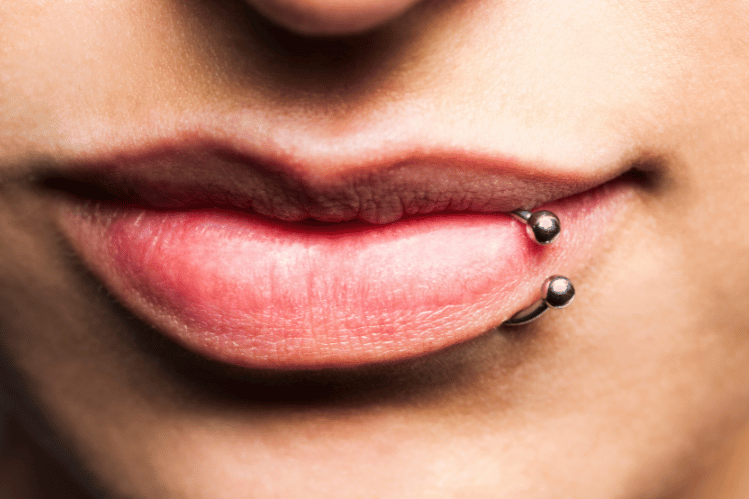
Introduction:
Oral piercings have become increasingly popular in recent years, with many individuals embracing this form of self-expression. While piercings can be a unique and fashionable way to enhance one's appearance, it is important to understand their potential impact on oral health, particularly in relation to teeth straightening. In this blog post, we will explore the effects of oral piercings on orthodontic treatment and overall oral health, highlighting the potential risks involved.
Risk of Damage to Teeth and Orthodontic Appliances:
Oral piercings, such as tongue or lip piercings, can pose a significant risk to the health of your teeth and any orthodontic appliances you may be wearing. The jewelry can come into direct contact with the teeth, causing chipping, cracking, or even tooth loss. Additionally, the metal components of braces or aligners can be damaged or dislodged by the piercing, compromising the effectiveness of orthodontic treatment.
Increased Risk of Infections:
The oral cavity contains a vast number of bacteria, and introducing a foreign object like a piercing increases the risk of infections. Oral piercings can create open wounds that serve as entry points for bacteria, leading to infections in the mouth. This can result in swelling, pain, and potentially more severe complications if left untreated. Infections can also interfere with the healing process of any oral surgical procedures, such as tooth extractions or dental implant placements, which may be necessary during orthodontic treatment.
Interference with Speech and Chewing:

Oral piercings, especially tongue piercings, can interfere with proper speech and chewing functions. The jewelry can obstruct the movement of the tongue, affecting pronunciation and articulation. Additionally, the presence of a piercing can cause discomfort and difficulty while chewing, potentially leading to altered eating habits and nutritional deficiencies.
Gum Recession and Periodontal Damage:
Constant contact between oral piercings and the gum tissues can lead to gum recession, a condition where the gums pull away from the teeth. Gum recession exposes the tooth roots, making them more vulnerable to decay, sensitivity, and potential tooth loss. Moreover, oral piercings can cause trauma to the gums, leading to irritation and inflammation. Prolonged irritation may contribute to the development of periodontal disease, a serious condition that affects the supporting structures of the teeth.
Interference with X-Rays and Dental Procedures:
During orthodontic treatment, regular dental visits and occasional X-rays are essential to monitor progress and ensure proper alignment. However, oral piercings can interfere with these procedures. Metal jewelry can obstruct X-ray images, making it challenging for dentists to obtain clear and accurate diagnostic information. In some cases, the piercing may need to be removed temporarily to facilitate the dental procedure, adding inconvenience and discomfort.
Conclusion
While oral piercings may be a trendy and fashionable way to express oneself, it is crucial to consider the potential impact on teeth straightening and overall oral health.
The risks associated with oral piercings, including damage to teeth, increased infection risk, speech difficulties, gum recession, and interference with dental procedures, cannot be overlooked. If you are undergoing orthodontic treatment or planning to, it is advisable to consult with your orthodontist or dentist before getting an oral piercing.
They can provide personalized advice based on your specific situation and guide you towards making informed decisions that prioritize your oral health. Remember, maintaining a healthy smile should always be a top priority.
Book a consultation with AlignerCo Canada today to discuss your orthodontic treatment and learn more about the impact of oral piercings on your oral health.
FAQs
Can I get an oral piercing while wearing braces or aligners?
It is generally not recommended to get an oral piercing while undergoing teeth straightening treatment. The piercing can damage teeth and orthodontic appliances, affecting the effectiveness of treatment.
How can oral piercings lead to gum recession?
Oral piercings can constantly rub against the gums, causing irritation and trauma. Over time, this can lead to gum recession, exposing the tooth roots and increasing the risk of tooth decay and loss.
What are the signs of an infection in an oral piercing?
Signs of an infection include swelling, pain, redness, discharge, and difficulty in speaking or eating. If you suspect an infection, seek professional dental care promptly.
Can I remove my oral piercing temporarily for dental procedures?
In some cases, your dentist may ask you to remove the oral piercing temporarily to facilitate dental procedures or X-rays. It is important to follow their instructions for a successful procedure.
Should I consult my orthodontist before getting an oral piercing?
Yes, it is highly recommended to consult with your orthodontist or dentist before getting an oral piercing, especially if you are undergoing orthodontic treatment. They can provide personalized advice based on your specific situation and treatment plan.


